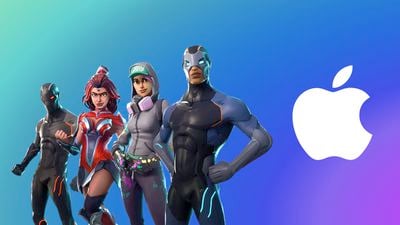Federal Judge Tosses Apple's Theft Claims in Ongoing Epic Games Legal Fight
A California federal judge on Tuesday dismissed some of Apple's counterclaims against Epic Games in its ongoing antitrust battle over Apple's App Store fees (via Bloomberg).

Apple and Epic have been in a legal fight since August, when Apple removed Fortnite from the App Store after Epic Games introduced a direct payment option in the app, defying the App Store rules. Epic Games promptly filed a lawsuit against Apple, accusing the company of anti-competitive actions.
In September, Apple filed a counter suit to stop the game maker from using its own payment system for Fortnite. Apple also accused Epic of theft and sought extra monetary damages beyond breach of contract.
In October, Epic filed a motion ahead of Tuesday's hearing seeking the dismissal of Apple's counterclaims of intentional interference with prospective economic advantage and conversion, along with its punitive damages bid.
On Tuesday, U.S. District Judge Yvonne Gonzalez Rogers granted Epic Games' motion for judgement, throwing out Apple's two claims for lost App Store fees and other monetary damages.
"This is a high-stakes breach of contract case and an antitrust case and that's all in my view," Gonzalez told Apple's lawyers, according to Bloomberg. "You can't just say it's independently wrongful. You actually have to have facts," the judge said, adding that the rest of the breach-of-contract case moves forward.
Apple told Bloomberg that it disagreed with the judge's decision, adding that it was clear that Epic breached its contract with the company. Epic in October had a preliminary injunction dismissed by the same judge, meaning Fortnite will remain unavailable on the App Store for the duration of the lawsuit, assuming that the app remains in violation of the App Store Review Guidelines. The case continues.
Popular Stories
Apple's next-generation iPhone 17 Pro and iPhone 17 Pro Max are less than three months away, and there are plenty of rumors about the devices.
Apple is expected to launch the iPhone 17, iPhone 17 Air, iPhone 17 Pro, and iPhone 17 Pro Max in September this year.
Below, we recap key changes rumored for the iPhone 17 Pro models:Aluminum frame: iPhone 17 Pro models are rumored to have an...
Apple is developing a MacBook with the A18 Pro chip, according to findings in backend code uncovered by MacRumors.
Earlier today, Apple analyst Ming-Chi Kuo reported that Apple is planning to launch a low-cost MacBook powered by an iPhone chip. The machine is expected to feature a 13-inch display, the A18 Pro chip, and color options that include silver, blue, pink, and yellow.
MacRumors...
In 2020, Apple added a digital car key feature to its Wallet app, allowing users to lock, unlock, and start a compatible vehicle with an iPhone or Apple Watch. The feature is currently offered by select automakers, including Audi, BMW, Hyundai, Kia, Genesis, Mercedes-Benz, Volvo, and a handful of others, and it is set to expand further.
During its WWDC 2025 keynote, Apple said that 13...
Apple hasn't updated the AirPods Pro since 2022, and the earbuds are due for a refresh. We're counting on a new model this year, and we've seen several hints of new AirPods tucked away in Apple's code. Rumors suggest that Apple has some exciting new features planned that will make it worthwhile to upgrade to the latest model.
Subscribe to the MacRumors YouTube channel for more videos.
Heal...
Apple is planning to launch a low-cost MacBook powered by an iPhone chip, according to Apple analyst Ming-Chi Kuo.
In an article published on X, Kuo explained that the device will feature a 13-inch display and the A18 Pro chip, making it the first Mac powered by an iPhone chip. The A18 Pro chip debuted in the iPhone 16 Pro last year. To date, all Apple silicon Macs have contained M-series...
Popular accessory maker Anker this month launched two separate recalls for its power banks, some of which may be a fire risk.
The first recall affects Anker PowerCore 10000 Power Banks sold between June 1, 2016 and December 31, 2022 in the United States. Anker says that these power banks have a "potential issue" with the battery inside, which can lead to overheating, melting of plastic...
Chase this week announced a series of new perks for its premium Sapphire Reserve credit card, and one of them is for a pair of Apple services.
Specifically, the credit card now offers complimentary annual subscriptions to Apple TV+ and Apple Music, a value of up to $250 per year.
If you are already paying for Apple TV+ and/or Apple Music directly through Apple, those subscriptions will...
As part of its 10-year celebrations of Apple Music, Apple today released an all-new personalized playlist that collates your entire listening history.
The playlist, called "Replay All Time," expands on Apple Music's existing Replay features. Previously, users could only see their top songs for each individual calendar year that they've been subscribed to Apple Music, but now, Replay All...






















